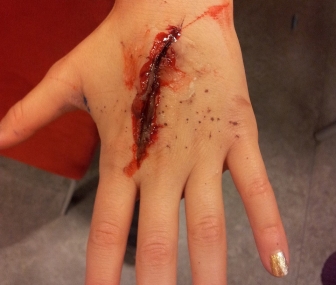An abscess is an accumulation of pus in a soft tissue of the body, often caused by a bacterial infection. Pus is a mixture of dead cells, bacteria and fluid that forms in response to infection. Abscesses can develop in different parts of the body, including the skin, teeth and internal organs. They can cause pain, swelling and other symptoms, and need to be treated by a doctor.
How do I treat an abscess with homeopathy ?
There are several homeopathic strains that can be used to relieve the symptoms associated with an abscess, in addition to conventional medical treatment. Some of the most commonly used strains include :
- Belladonna : this strain is often used to relieve the swelling and redness associated with an abscess.
- Hepar sulphuris calcareum : this strain can be useful for treating abscesses that are warm and painful to the touch.
- Silicea : this strain can be used to boost immune defenses and help the body eliminate the infection causing the abscess.
It is important to note that homeopathy should not be used in place of appropriate medical treatment for an abscess. If you are suffering from an abscess, it is advisable to consult a doctor for diagnosis and appropriate treatment. The doctor can also advise you on homeopathic strains that may be useful to complement your medical treatment.
Which plants can treat abscesses ?
There are several herbs that can be used in phytotherapy to relieve the symptoms associated with an abscess, as a complement to conventional medical treatment. Some of the plants most commonly used for this purpose include :
- Chamomile : this plant is often used for its anti-inflammatory and soothing properties. It can be used in tincture, powder or tablet form to relieve the pain and swelling associated with an abscess.
- Marjoram : this plant is renowned for its antiseptic and healing properties. It can be used in tincture or essential oil form to help cleanse abscesses and promote healing.
- Arnica : this plant is often used in phytotherapy to relieve pain and swelling. It can be used in tincture or tablet form to relieve symptoms associated with an abscess.
It is important to note that phytotherapy should not be used in place of appropriate medical treatment for an abscess. If you are suffering from an abscess, it is advisable to consult a doctor for diagnosis and appropriate treatment. The doctor can also advise you on which plants might be useful to complement your medical treatment.
Using aromatherapy
Aromatherapy can be used to complement conventional medical treatment to relieve symptoms associated with an abscess, but should not be used in place of appropriate medical treatment. Certain essential oils can help boost the immune system and promote abscess healing, but they cannot eliminate the bacterial infection that caused the abscess in the first place. It's important to consult a physician to obtain a diagnosis and appropriate treatment for your abscess. The doctor may prescribe antibacterial medication to eliminate the infection and prevent the abscess from worsening. If the abscess is located in a deep part of the body, it may be necessary to drain it surgically to remove accumulated pus. In general, aromatherapy can be used in conjunction with conventional medical treatment to relieve the symptoms associated with an abscess.symptoms associated with an abscess, but should not be used in place of appropriate medical treatment.
How to manage an abscess

Here are a few dietary and hygienic tips to help prevent abscesses and promote healing :
- Drink plenty of water to keep your body well hydrated and help your immune system fight infection.
- Eat a balanced diet rich in fruits and vegetables, lean proteins and whole grains to boost your immune system.
- Avoid sugary foods and drinks, which can aggravate bacterial infections.
- Avoid fatty and fried foods, which can disrupt digestion and weaken the immune system.
- Maintain good personal hygiene by regularly washing your hands with soap and water to avoid spreading bacterial infections.
- If you have an abscess, avoid touching or scratching the affected area, as this can spread the infection and worsen symptoms.
- If you suffer from an abscess, it's important to consult a doctor for diagnosis and appropriate treatment. The doctor may prescribe antibacterial medication to clear the infection and prevent the abscess from worsening.







